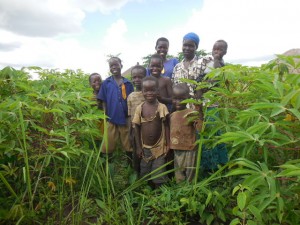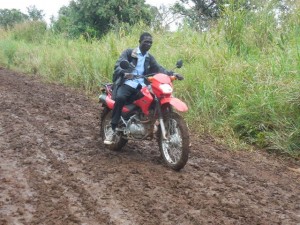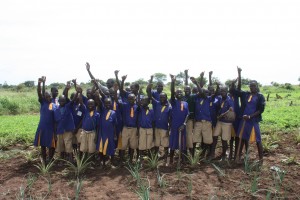Meet Sarah: business woman in the making !
November 20, 2015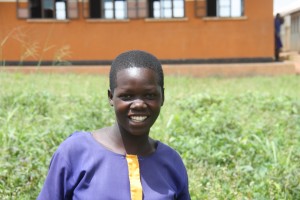 Sarah Aber, 14, is Vice Chairperson of the Pupil’s Entrepreneurship Club at Otwe Primary School Demonstration Garden. Her role varies from taking minutes at meetings, to mobilizing absconding club members and even organizing meetings herself if the chairperson is absent:
Sarah Aber, 14, is Vice Chairperson of the Pupil’s Entrepreneurship Club at Otwe Primary School Demonstration Garden. Her role varies from taking minutes at meetings, to mobilizing absconding club members and even organizing meetings herself if the chairperson is absent:
“My vice-chair responsibilities are that I should ensure that things are in place and going on as it was planned.”
The role is giving Sarah the opportunity to put all she has learned in the African Revival trainings into practice. Indeed, taking account of supply and demand, she plans to sell the group’s bean crop very soon because beans are currently scarce in Amuru district due to the drought – so Sarah is already anticipating that they will fetch a higher price at market:
“What we are going to do, we are going to sell our produce per kilo for 5,000 sh (90p, 10kr), because we understand that these beans are a bit scarce in the market […]
we want to have that opportunity so that we get more money from it”
Furthermore, Sarah has already helped to secure transport to the market in Gulu by negotiating to use the headmistress’s motorbike; the group will then use the profits generated by the sale of their bean crop to refund petrol costs.
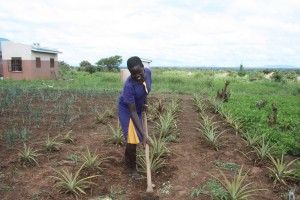 Sarah’s improved skills in farming, agricultural management and marketing have also sparked in her parents a greater interest in their daughter’s education:
Sarah’s improved skills in farming, agricultural management and marketing have also sparked in her parents a greater interest in their daughter’s education:
“This thing [SDG] is making my parents actually visit the school, because the knowledge I have now has motivated my parents to come and see what I am doing at school, and now they are happy, and actually in a week now, my parents can be here twice or three times […] checking on my report.”
And they are sure to be pleased. Sarah is a very good student, always placed in division two (meaning she scores approximately 80% in tests), and has ambitions to become an English teacher in the future. Sarah’s advice for other girls her age? To surround themselves with good friends who are a positive influence. And the knowledge she wants to pass to her peers is equally useful:
“ I’m going to teach them how to plant beans in lines and also how to manage bean production, right from planting up to investing; that’s what I am going to teach the rest.”
Sarah lives three kilometres from Otwe Primary School with her mother, father and six siblings. The family cultivates a range of crops, including groundnuts and rice, and has recently diversified further into growing vegetables.
The knowledge Sarah has brought back home from the SDG and Pupil Entrepreneurship Club is not only boosting the productivity of the family farm, but also teaching Sarah’s parents how to properly manage and market the surplus in order to generate a good profit:
“Sarah told us […] the importance of early planting which she said if we plant our crops early, we will be able to take the advantage of ready markets”
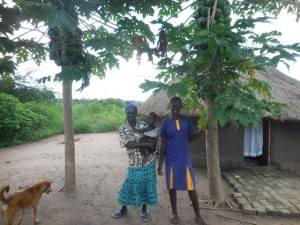 Sarah’s mother, Christine, is particularly enthusiastic about the skills that she has learnt from Sarah:
Sarah’s mother, Christine, is particularly enthusiastic about the skills that she has learnt from Sarah:
“We learnt from our daughter the marketing technique […] whereby we stock our produce as a group (with neighboring farmers) in bulk and later sell […] This is very good technique simply because in a group, there’s good bargaining power and no buyer can cheat us as compared to the way we used to in the past.”
Christine also credits Sarah with teaching her about good post-harvest crop management in order to avoid the losses that the family used to suffer. This includes how to dry, sort, store and handle different crops.
Moreover, Sarah has brought back new agricultural methods, teaching her parents how to plant in rows, as well as “the advantage of keeping our garden clean and weed free” in order to prevent pests. The new kitchen garden, situated right next to her cooking area, has also given Sarah’s mother a more efficient way to dispose of the kitchen refuse.
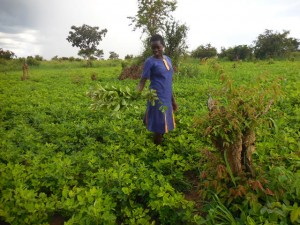 Christine hopes that these new business and agricultural skills allow her children to “take my footsteps in farming […] and make them to be self reliant and fruitful in the near future.”
Christine hopes that these new business and agricultural skills allow her children to “take my footsteps in farming […] and make them to be self reliant and fruitful in the near future.”
But she is also adamant that Sarah should continue her formal education at secondary level and apply her new skills to succeed at both farming and school, and in the future realize her dream of becoming a teacher.
Posted in News | Leave a comment
African Revival Needs Motorbikes!
November 19, 2015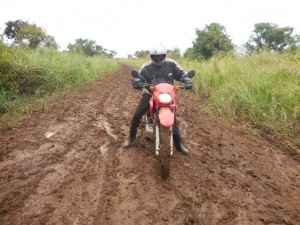 We are currently looking for funding for two motorbikes in Uganda! Our Uganda team use motorbikes every day to visit our projects in schools and communities across the north of the country.
We are currently looking for funding for two motorbikes in Uganda! Our Uganda team use motorbikes every day to visit our projects in schools and communities across the north of the country.
Motorbikes are the preferred means of transport for our staff as they are often the only way that staff can reach very isolated schools. In northern Uganda, many rural communities lack even the most basic road infrastructure. In some cases, the only access routes to some of the schools where we work are rough dirt tracks, barely visible amongst the thick undergrowth. Cars struggle to cope with these routes – so this is where motorbikes come in! They allow staff to reach project sites quickly, enabling them to properly cover multiple schools in a day and increasing the amount of support we can offer to our beneficiaries. And not only are motorbikes more resilient than cars through rural terrain in both dry and wet seasons, they are also cheaper to run and repair if needed.
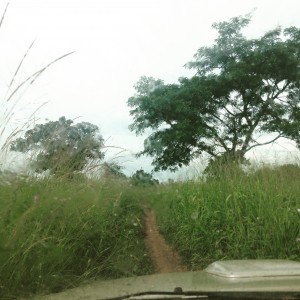 However, we currently have a significant shortage of motorbikes at our Head Office in Gulu, northern Uganda. This limits the effectiveness of our work, as employees wait for use of the motorbikes or wait to use more unreliable and expensive vehicles. Francis Nyeko, our Livelihoods Project Coordinator, highlights the problems this causes:
However, we currently have a significant shortage of motorbikes at our Head Office in Gulu, northern Uganda. This limits the effectiveness of our work, as employees wait for use of the motorbikes or wait to use more unreliable and expensive vehicles. Francis Nyeko, our Livelihoods Project Coordinator, highlights the problems this causes:
“This will affect work because there are multiple project sites/schools/districts and the vehicle cannot manage to take staff as scheduled. Field work will be scaled down because field staff will have no means to reach out to beneficiaries to implement projects.”
Having an extra two motorbikes will ensure that this scaling back of our work doesn’t happen. In fact, as Vincent, our Construction Project Co-ordinator states: “having more bikes would mean each project staff member could be assigned a bike. This would mean more coverage and frequent visits to address the project needs effectively”.
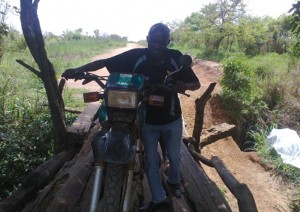 Increasing the number of motorbikes would therefore not only ensure our work isn’t scaled back, it would also increase the amount of schools and communities our staff are able to reach. However, in order for this to be possible we need to raise £6,187 to purchase the two motorbikes. Can you help us reach this target?
Increasing the number of motorbikes would therefore not only ensure our work isn’t scaled back, it would also increase the amount of schools and communities our staff are able to reach. However, in order for this to be possible we need to raise £6,187 to purchase the two motorbikes. Can you help us reach this target?
You can donate online (please make sure you get in touch with us to let us know your donation is for motorbikes), over the phone at 020 8939 3190 or by sending a cheque (made payable to African Revival) to African Revival, 161 High Street, Hampton Hill, TW12 1NG. You can also e-mail us at info@africanrevival.org if you would like any further information.
Thank you!
Posted in News | Leave a comment
This is Ben!
November 19, 2015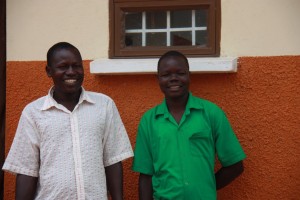 Ben is 15 years old and currently in P6 where he especially enjoys his mathematics and science classes. As his father, Edward (on the left), is the Deputy of Layima Primary School, Ben resides in the teachers quarter together with his mother, Mary, and sister, Patricia, who is in P3 in Atiak Primary School. His older brother, Francis, is in P7 at boarding school in Gulu.
Ben is 15 years old and currently in P6 where he especially enjoys his mathematics and science classes. As his father, Edward (on the left), is the Deputy of Layima Primary School, Ben resides in the teachers quarter together with his mother, Mary, and sister, Patricia, who is in P3 in Atiak Primary School. His older brother, Francis, is in P7 at boarding school in Gulu.
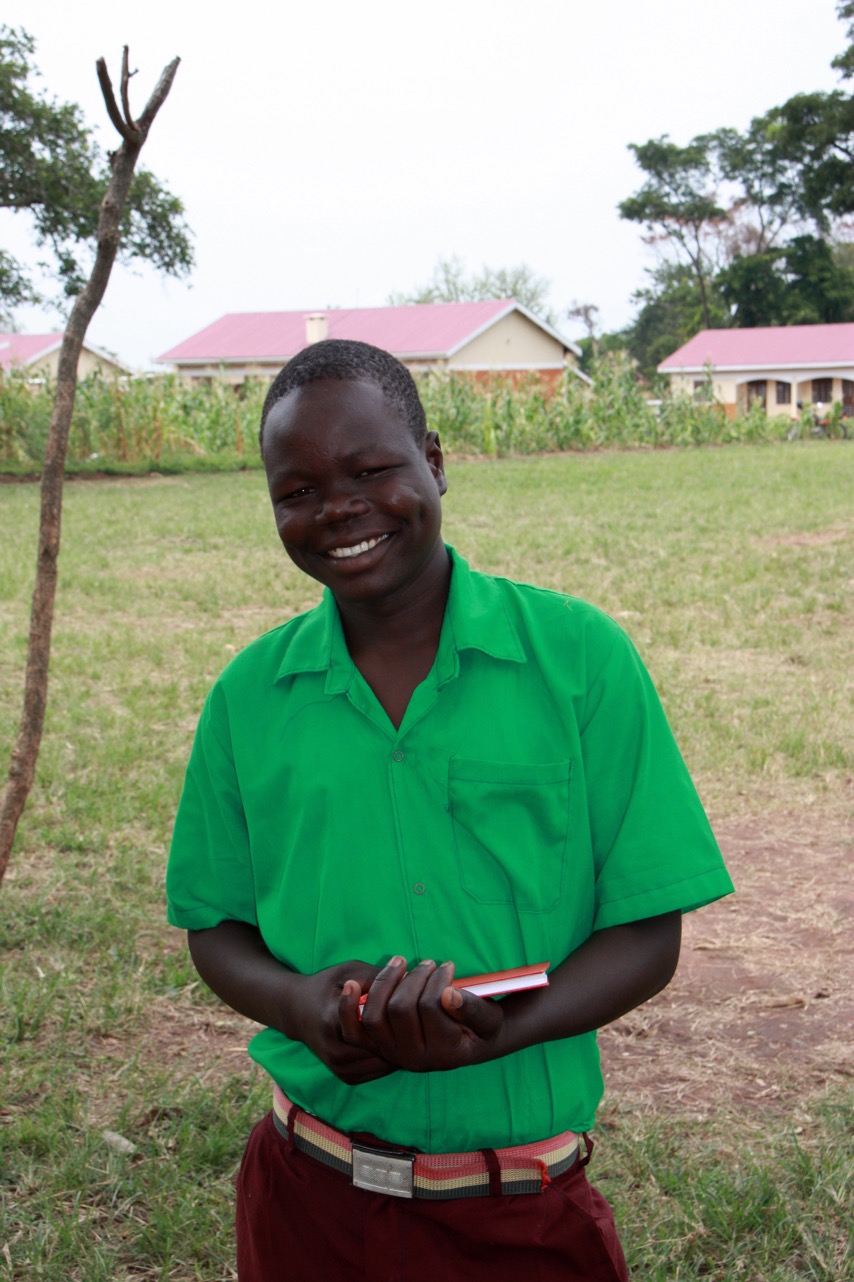 He first heard about the club during a school assembly and seeing the parent-led school demonstration garden develop right in front of his eyes and inspired by the thought of creating something similar with his fellow pupils, he was motivated to join the club. He clearly saw the benefits this club will have for each one of them:
He first heard about the club during a school assembly and seeing the parent-led school demonstration garden develop right in front of his eyes and inspired by the thought of creating something similar with his fellow pupils, he was motivated to join the club. He clearly saw the benefits this club will have for each one of them:
“It is good because in the event that you leave school and if you don’t continue with your further studies, the things that you have learnt, the farming skills that you have acquired from here, you can now apply at home and as you are living.”
Already a few months ago, when they had only had a few meetings yet, Ben was looking forward to getting the garden started, as he believes:
“I am going to acquire the skills for nursery bed management, so that I can then grow vegetables and earn lot of money from it.”
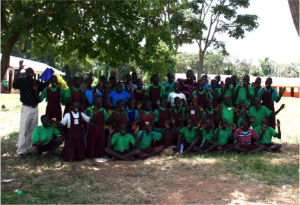 Ben is not only one of the 50 members of the pupils’ entrepreneurship club, but has also been selected to be the club’s chairman probably because of his very honourable and reserved nature. He represents the spokesperson of the pupils’ entrepreneurship club which also entails tasks such as “conducting meetings with visitors, if they come; and also to conduct meetings with the club members to agree on what they are going to do, their activities”.
Ben is not only one of the 50 members of the pupils’ entrepreneurship club, but has also been selected to be the club’s chairman probably because of his very honourable and reserved nature. He represents the spokesperson of the pupils’ entrepreneurship club which also entails tasks such as “conducting meetings with visitors, if they come; and also to conduct meetings with the club members to agree on what they are going to do, their activities”.
As the club’s chairperson he has already thought about possible challenges they could and preventive measurements – as for example: theft –
“I am worried that if the crops start performing well, some other children might come and start stealing it. That could be a potential challenge. Therefore, we will continuously, when we are in the school, monitoring it. But during weekends, since I come from the quarters, I will take charge as a chairperson!”
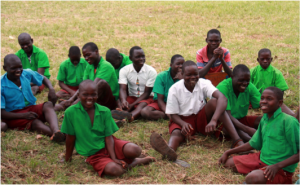 Ready to take up responsibility, Ben and his fellow pupils are looking forward to the “training on economic practices of onions and then training on business”. Ben already has a clear idea about how the profits could be used:
Ready to take up responsibility, Ben and his fellow pupils are looking forward to the “training on economic practices of onions and then training on business”. Ben already has a clear idea about how the profits could be used:
“I would prioritise the uniform, school uniforms, I would like to contribute towards that. And then, part of the income of the club is also contributed to the school to buy scholastic materials and the school can also, with my advice, buy a football – so that the children can play during games time.”
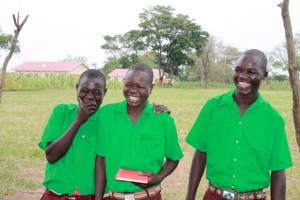 A proper football had to come on the list, just because the pupils love to play football – in particular Ben (centre) and his friends, Richard (left) and Francis (right)! Ben is a striker and tries to follow up with football, always cheering for Arsenal with Alexis Sánchez being his favourite player!
A proper football had to come on the list, just because the pupils love to play football – in particular Ben (centre) and his friends, Richard (left) and Francis (right)! Ben is a striker and tries to follow up with football, always cheering for Arsenal with Alexis Sánchez being his favourite player!
SDG: Pupils’ Entrepreneurship Clubs
November 18, 2015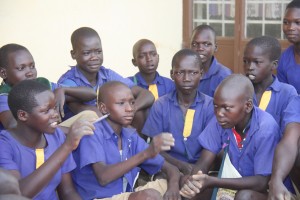 Pupils’ entrepreneurship clubs have also now been established in all 15 schools that African Revival works with through the School Demonstration Garden Project. There are 50 members with equal number of boys and girls in each school. The club members have elected their leaders and are being guided by a teacher from each school. Having selected their crops to plant, which will form their micro enterprises, members are now undergoing training on business planning and management using the School Enterprise Challenge methodology by Teach A Man to Fish. These newly acquired business skills are to be implemented within their school garden project. This practical application will serve as a unique and useful experience for these pupils, equipping them with the skills to flourish in the business of farming, leading to increased professional stability when they leave school.
Pupils’ entrepreneurship clubs have also now been established in all 15 schools that African Revival works with through the School Demonstration Garden Project. There are 50 members with equal number of boys and girls in each school. The club members have elected their leaders and are being guided by a teacher from each school. Having selected their crops to plant, which will form their micro enterprises, members are now undergoing training on business planning and management using the School Enterprise Challenge methodology by Teach A Man to Fish. These newly acquired business skills are to be implemented within their school garden project. This practical application will serve as a unique and useful experience for these pupils, equipping them with the skills to flourish in the business of farming, leading to increased professional stability when they leave school.
Otwe Pupils’ Entrepreneurship Club
The Otwe Primary SDG Pupils’ Entrepreneurship club is in high spirits. The bean crop that they planted back in March is doing very well, despite a prolonged drought and damage from stray animals. The rain has at last come, and the pupils are seeing the bountiful effects of their hard work. Soon they hope to harvest and have already started to scout out surrounding villages and towns to assess market potential and decide which marketplace will bring them the highest profit. Head of Marketing, Boniface Rubanga, explained in more detail how the club chooses where to sell:
“Me and the marketing team go to the market and ask for the middle man, and if we think that place can fit in our needs, we can choose that middle man to take the produce.
We prefer selling our things in kilos because with these cup things they can cheat you. For Kilos, you can weigh from here and you can easily come to market and know what you are going to get.”
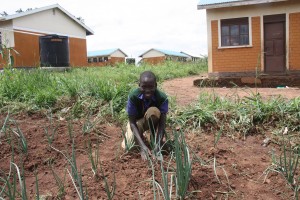 The club has recently received training in marketing skills to support them in this aspect of the project. African Revival Project Officer Babra notes that one of the principle objectives is to enable them to be self-reliant in the future:
The club has recently received training in marketing skills to support them in this aspect of the project. African Revival Project Officer Babra notes that one of the principle objectives is to enable them to be self-reliant in the future:
“We actually train them on how to produce, how to invest, how to add value to the products and how to market it […] our schools are located in the rural areas where the major activities are actually farming but the pupils have realized that the actual challenge faced is the marketing strategy.”
The skills transferred through the Pupil’s Entrepreneurship Club are helping to fill this gap in knowledge and ensure that pupils can effectively handle the post-production and financial aspect of farming.
And some of them already have interesting plans for how they will use the profits from the bean crop, a portion of which will be shared amongst group members (the rest will be added to the group account for future activities). Boniface wants to save his cut with the help of his mother, who is in the Parents’ VSLA group:
“I am in p6 and next year I am in p7. With these savings, it’s going to help me to buy some text books to help me prepare for the national examinations.”
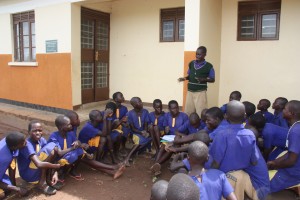 While Boniface has ambitions to become a vicar when he leaves school, he also intends to keep on farming alongside this profession in order to provide his household with a secure source of nutrition, and generate a profit through selling the surplus. As such, the business skills he is learning through the Pupils’ Entrepreneurship Club will continue to serve him well in the future.
While Boniface has ambitions to become a vicar when he leaves school, he also intends to keep on farming alongside this profession in order to provide his household with a secure source of nutrition, and generate a profit through selling the surplus. As such, the business skills he is learning through the Pupils’ Entrepreneurship Club will continue to serve him well in the future.
Posted in News | Tagged Development, Gulu, School Development, School garden, Uganda | Leave a comment
Layima Primary School
November 17, 2015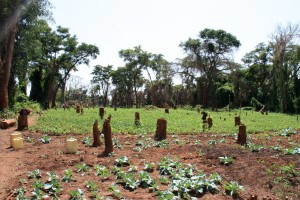 Layima Primary School is a remote school, surrounded by green fields and beautiful majestic trees. The school has come a long way since its humble beginnings in 1982 as a small community school. With the support of organisations such as Save the Children and NUDEIL, they have been able to build appropriate teachers’ houses and classrooms blocks for the nine teachers and 381 pupils of the school:
Layima Primary School is a remote school, surrounded by green fields and beautiful majestic trees. The school has come a long way since its humble beginnings in 1982 as a small community school. With the support of organisations such as Save the Children and NUDEIL, they have been able to build appropriate teachers’ houses and classrooms blocks for the nine teachers and 381 pupils of the school:
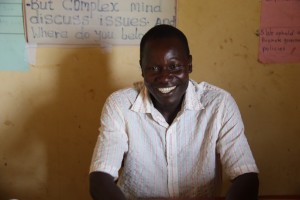 “If I am to compare the way this school has started, and where it is now – because at first, like let’s take from myself, because I am now making 3 years. The first time I came, there was no road leading to this school; not even borehole – you had to move a distance to collect water; no proper accommodation as for now; even, we don’t have even classes, but at the moment, we have. At first we have started with 100 something pupils, but now we are reaching 400! The school is now climbing the latter.” (Edward, Deputy (photo))
“If I am to compare the way this school has started, and where it is now – because at first, like let’s take from myself, because I am now making 3 years. The first time I came, there was no road leading to this school; not even borehole – you had to move a distance to collect water; no proper accommodation as for now; even, we don’t have even classes, but at the moment, we have. At first we have started with 100 something pupils, but now we are reaching 400! The school is now climbing the latter.” (Edward, Deputy (photo))
Step by step, the school is trying to overcome the challenges it faces – like the lack of parental awareness of the importance of education and involvement: parents often stop their children from going to school in the rainy season, as they are needed for harvesting crops; additionally, the majority of parents struggle to pay school fees which triggers severe financial difficulties for the school. This is exactly why the SDG project is so important for the school:
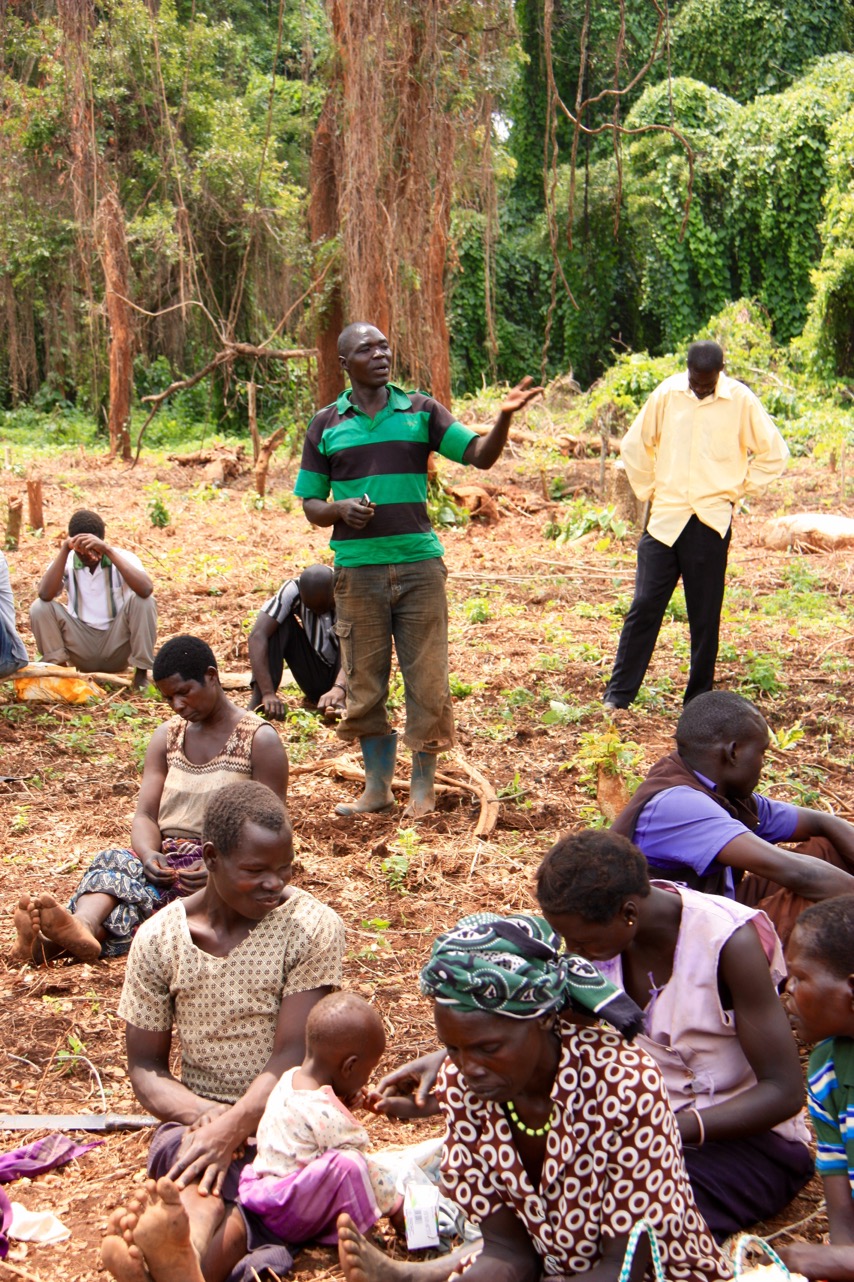 “This SDG can be one of the methods of creating awareness to the parents and they are now able to see the importance of education – through what they are doing in the club: The parents are learning in the club, because AR is giving them methods of planting, how to take care of crops, the methods of spraying, so they realise “how would I know this kind of pesticide to spray, if I have not gone? Now since my time is over, can I now reinforce the learning of my child?”
“This SDG can be one of the methods of creating awareness to the parents and they are now able to see the importance of education – through what they are doing in the club: The parents are learning in the club, because AR is giving them methods of planting, how to take care of crops, the methods of spraying, so they realise “how would I know this kind of pesticide to spray, if I have not gone? Now since my time is over, can I now reinforce the learning of my child?”
Through the parents we can give some light sensitisation as they spread the knowledge with the community. And now, on top of this, when the project is over, we can still mobilise people to make a larger group! Now when you start doing this there was a lot of information to take in, but people will see “ok I have now come to realise that it is my responsibility to make this place better” – so we can use this small group to expand to the other. So that I hope, within this year, that you will see a lot of changes to come. ” (Paul, pupils’ club focal teacher)
Deputy, Edward, even gives example of changes:
 “At first, parents, most of the parents, they don’t come to school to visit their children, to see how their children are studying but with this demonstration, they have started coming. When they will be coming for the work, some of them take they time and monitor how the children are learning. The way it is, they have heard that they are going to benefit, and one of the benefit, the day they will sell these, whatever they are doing, part of that money, they will pay for their children to go to the school – that’s what they are usually saying. And more so, some of them, started doing this community work at school – like clearing this field. They did it. To me, I think, it is because of this demonstration – otherwise, they wouldn’t have done it.”
“At first, parents, most of the parents, they don’t come to school to visit their children, to see how their children are studying but with this demonstration, they have started coming. When they will be coming for the work, some of them take they time and monitor how the children are learning. The way it is, they have heard that they are going to benefit, and one of the benefit, the day they will sell these, whatever they are doing, part of that money, they will pay for their children to go to the school – that’s what they are usually saying. And more so, some of them, started doing this community work at school – like clearing this field. They did it. To me, I think, it is because of this demonstration – otherwise, they wouldn’t have done it.”
Moreover, the Deputy has also seen the skills which can be transferred back to the parents’ villages and greater community:
“For example, there is one woman here, who has started using this, how do you call it, it is a system of planting, where you get a sack, pour some sand inside and you put holes in side for onions … There are many in this community. They have started practising. That is really very encouraging.”
Furthermore, an unexpected benefit which the school has experienced through the SDG, is a slow easing of a land dispute between the original land owner and founder of the school grounds and the community. Ever since his wife and other members of his family have been taking part in the SDG, the situation has become more peaceful and slow reconciliation is taking place.
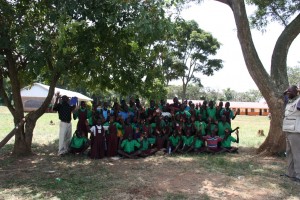 Not only is the parent-led SDG enjoying success at the school, pupils were also eager to join the pupils’ entrepreneurship club ! The pupils are actively participating with great motivation which is sure, to make this project successful! Additionally, teachers unanimously agree that the pupils’ club will be beneficial for its members, as well as the greater community:
Not only is the parent-led SDG enjoying success at the school, pupils were also eager to join the pupils’ entrepreneurship club ! The pupils are actively participating with great motivation which is sure, to make this project successful! Additionally, teachers unanimously agree that the pupils’ club will be beneficial for its members, as well as the greater community:
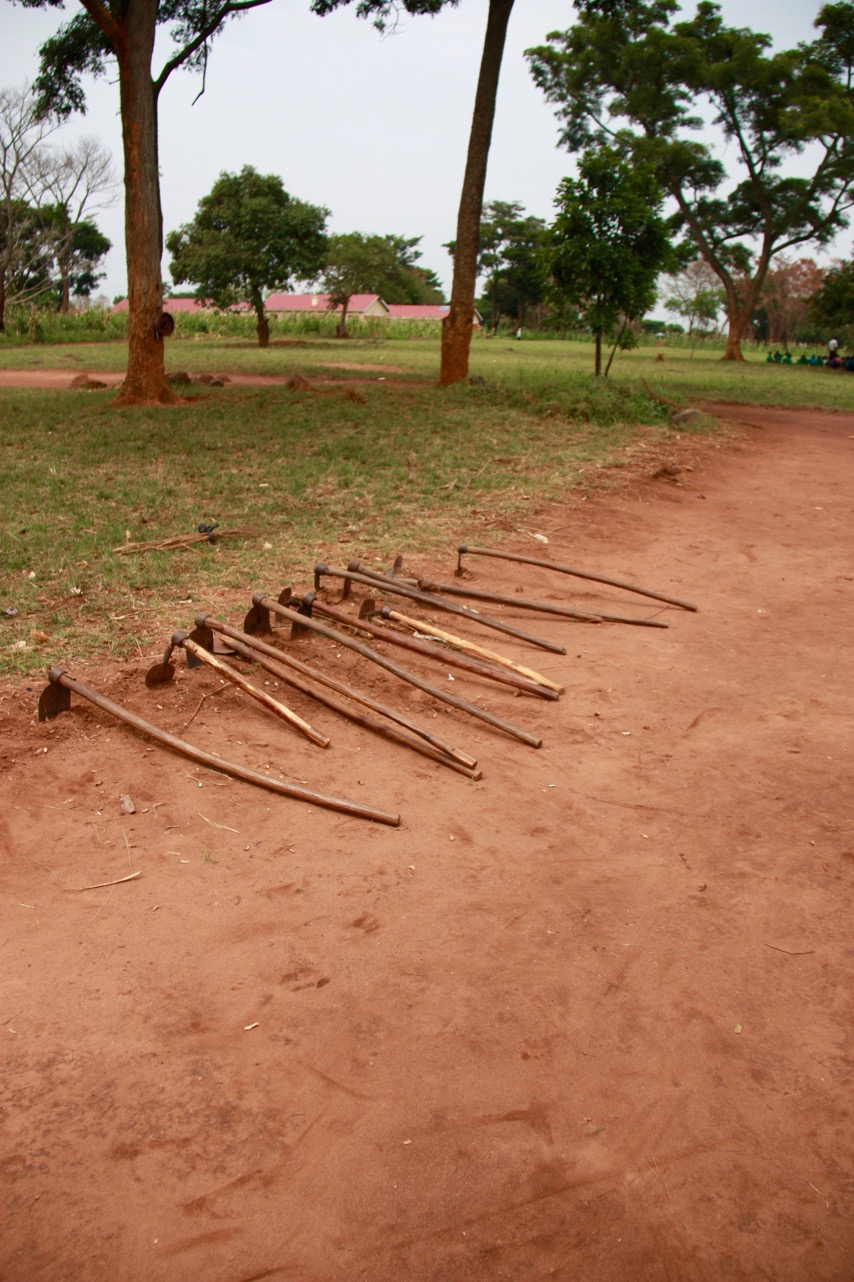 Yeah acquiring agriculture skills are important, because they can, from here, even if those who cannot be in position to go further with their studies, they can be self-reliance. They can feed them by themselves. And more so, this project can encourage them to do much even from home. (Edward, Deputy)
Yeah acquiring agriculture skills are important, because they can, from here, even if those who cannot be in position to go further with their studies, they can be self-reliance. They can feed them by themselves. And more so, this project can encourage them to do much even from home. (Edward, Deputy)
This club is really very interesting, because it promotes pupils to being self-reliant, cause when they practise like planting onions, when they practise like when they are in the school here, and then when they go back to their villages, I think, when they go back with what we have given them, plant here properly, from who they will go and direct income. So it is very welcoming to me. (Patrick, club’s focal teacher)
Posted in News | Leave a commentDouble Your Donation on the Big Give Christmas Challenge!
November 17, 2015The Big Give Christmas Challenge
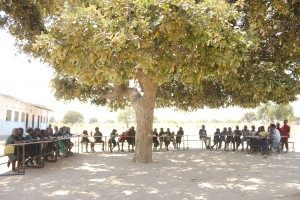 African Revival has been selected to be part of the Big Give Christmas Challenge 2015 – this means we’ll be eligible to get match-funding to build latrines and hand-washing facilities as well as provide teaching and learning materials for Sikalele Community School, in southern Zambia.
African Revival has been selected to be part of the Big Give Christmas Challenge 2015 – this means we’ll be eligible to get match-funding to build latrines and hand-washing facilities as well as provide teaching and learning materials for Sikalele Community School, in southern Zambia.
We’ve already secured £3,150 in pledges in the first phase of the challenge – but to secure the total £6,300 we’re eligible to receive on top of this from the Big Give, we need to raise £6,300 from online donations when the challenge opens. That’s where you come in!
The next phase of the challenge will be open between midday and midnight on Friday 4th December, when donations made to our Sikalele project on the Big Give websitewill be doubled! So if you donate £200, we’ll receive £400 (until we reach our target, or the match-funding pot runs out).
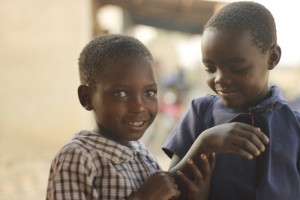 Not around on Friday 4th December? Don’t worry! The online donation window will open again on Saturday 5th December from midday, and will close at 5pm on Monday 14th December.
Not around on Friday 4th December? Don’t worry! The online donation window will open again on Saturday 5th December from midday, and will close at 5pm on Monday 14th December.
The key thing to remember is that this is a competition for all the charities on the challenge – as there isn’t enough match-pot funds for all charities to reach their targets. That means we need as many online donations as possible on the 4th and 5th December, as matching is done a first-come-first-served basis. After the matching-pot runs out, you’ll still be able to donate to the project, but your donation won’t be matched.
Sikalele Community School
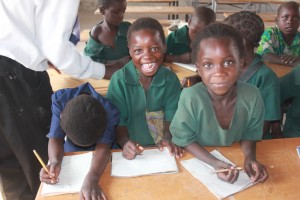 Sikalele Community is located in Kalomo, a town in one of the most impoverished areas of southern Zambia. The area faces complex barriers to quality education provision, recording the poorest national and district exam results. Despite these problems, African Revival is the only international NGO remaining in the area.
Sikalele Community is located in Kalomo, a town in one of the most impoverished areas of southern Zambia. The area faces complex barriers to quality education provision, recording the poorest national and district exam results. Despite these problems, African Revival is the only international NGO remaining in the area.
Sikalele currently has a big intake with 405 pupils aged 7- 19, but only 4 teachers and 2 classroom blocks with very few basic facilities. The school is especially lacking in toilets and teaching/learning materials, with just 6 latrines and 20 up-to-date textbooks between all 405 pupils currently enrolled. Consequently, Sikalele urgently needs a greater number of latrines, as well as hand-washing facilities, and more basic teaching/learning materials like textbooks and pens.
Latrines, Hand-Washing Facilities and Teaching/Learning Materials
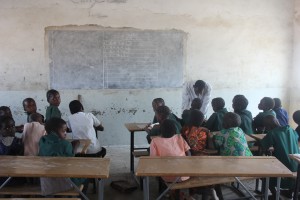 Sikalele Community School is in desperate need of teaching/learning materials, permanent latrines and hand-washing facilities. But despite these obstacles, the teachers, community and pupils are all working very hard to do their bit in making Sikalele the best it can be. Here at African Revival, our goal is help children’s dreams grow and not get squashed, which is why we want to continue supporting the school in meeting these needs so that the children of Sikalele can enjoy a quality education which will enable them to pursue bright futures and fulfil all their dreams-more than they ever thought possible!
Sikalele Community School is in desperate need of teaching/learning materials, permanent latrines and hand-washing facilities. But despite these obstacles, the teachers, community and pupils are all working very hard to do their bit in making Sikalele the best it can be. Here at African Revival, our goal is help children’s dreams grow and not get squashed, which is why we want to continue supporting the school in meeting these needs so that the children of Sikalele can enjoy a quality education which will enable them to pursue bright futures and fulfil all their dreams-more than they ever thought possible!
Please help us provide latrines, hand-washing facilities and teaching and learning materials at Sikalele by donating online through the Big Give Christmas Challenge on the 4th and 5th December 2015.
Want to know more about the project or the challenge itself? Just follow these links:
Posted in News | Leave a commentWelcome Lily!
November 16, 2015Today we ar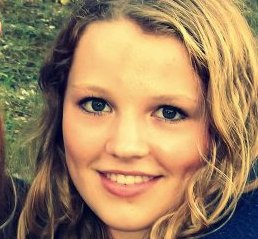 e very excited to welcome new volunteer Lily Kelly-Tarrant to the UK office! Lily joins African Revival as a Trusts and Foundations Volunteer. She is half way through her Undergraduate Degree in International Development at the University of Sussex. She has volunteered in Malawi, Kenya and Ghana and is excited to build her skills and experience at African Revival. Lily also enjoys music and loves to dance.
e very excited to welcome new volunteer Lily Kelly-Tarrant to the UK office! Lily joins African Revival as a Trusts and Foundations Volunteer. She is half way through her Undergraduate Degree in International Development at the University of Sussex. She has volunteered in Malawi, Kenya and Ghana and is excited to build her skills and experience at African Revival. Lily also enjoys music and loves to dance.
Click here to find out more about our volunteering opportunities!
Posted in News | Leave a commentSDG Staff Profiles: Meet Babra!
November 12, 2015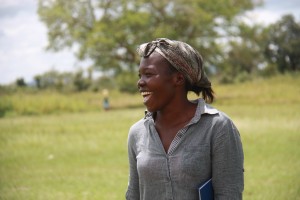 Babra Akello, aged 27, Is African Revival’s Agricultural Project Officer. Originally from Lira, she moved to Gulu together with her husband, with whom she has four year-old twins Jemimmah and Jesse. Babra completed a Certificate in General Agriculture at Busitema University in Soroti district, and is now studying part time for her degree in Agriculture at Uganda Martys University. After roles with the International Institute of Rural Reconstruction and Action Against Hunger, she joined African Revival in January 2012 as an Agricultural Extension Worker, before being promoted to Agricultural Project Officer. Here, Babra tells us more about her role with AR and her long-standing passion for farming.
Babra Akello, aged 27, Is African Revival’s Agricultural Project Officer. Originally from Lira, she moved to Gulu together with her husband, with whom she has four year-old twins Jemimmah and Jesse. Babra completed a Certificate in General Agriculture at Busitema University in Soroti district, and is now studying part time for her degree in Agriculture at Uganda Martys University. After roles with the International Institute of Rural Reconstruction and Action Against Hunger, she joined African Revival in January 2012 as an Agricultural Extension Worker, before being promoted to Agricultural Project Officer. Here, Babra tells us more about her role with AR and her long-standing passion for farming.
In my degree in agriculture I’m learning a lot. For example, the aspects of agricultural development, sustainable management of resources and different techniques of growing crops and handling animals. It’s a broad course.
My responsibilities as Agricultural Project Officer are to ensure that I directly implement African Revival’s project with the beneficiaries in the schools that we work with and to offer trainings in agricultural practices, VSLA and business skills. And also I do represent AR at a parish level, district level and country level. Now, I am implementing the school demonstration garden in 8 schools in Amuru district, so ensuring that all the good agricultural practices are taught and ensuring that what I am training the beneficiaries, they are also learning and replicating at the household level. And with the pupil’s clubs, ensuring that they are taught business models so that they can be well acquainted with the life after school, so that in case they don’t continue with their studies they can be self-reliant and not dependent on their parents.
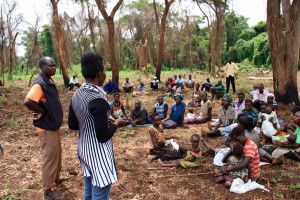 I have done many vocational trainings while working for African Revival and other organisations. I underwent defensive motorbike training. This is more of a safety thing, when you are riding, what you should observe, and actually how to overcome some of the faults or breakdowns in the motorcycle, so you can fix them without taking them to the mechanics. Just to keep you safe when you are driving.
I have done many vocational trainings while working for African Revival and other organisations. I underwent defensive motorbike training. This is more of a safety thing, when you are riding, what you should observe, and actually how to overcome some of the faults or breakdowns in the motorcycle, so you can fix them without taking them to the mechanics. Just to keep you safe when you are driving.
During my free time I like interacting with the children. With my own, but even with other children. The children like me even if I reach home you may not even understand who is my child or who is not my child because every time I am surrounded by children so I just enjoy interacting with them in my free time. The children collect their homework and I actually help them because as a parent, you should guide them. Where we live, there are many children and they are going in the same school, and they converge together and we do it together.
Being a child-centred person, I so much enjoy working with the children involved in the SDG Pupil’s Entrepreneurship Club. I just enjoy focusing on the future of the children. And the other thing I enjoy most is also working with the community that African Revival works with. It is not easy in the north to find parents in the school, but what I like most about our project is that it brings the parents closer to the school, and makes them know the benefit of education. Children can’t move forward without the support of their parents, so therefore African Revival having their projects bring parents closer to the school makes me more interested, and I enjoy it.
When I was younger, I wanted to be a veterinary doctor. In my village, we had only one veterinary doctor, and my father used to have animals, chickens, goats, cows, and each time this vet comes, he would treat the animals and he would be given a big sum of money. And I put into my mind that I must study and become a vet doctor so that I can treat these animals of ours on my own! And I wanted to actually out-compete him in the village so that I could also be the one getting such money from the communities around us. I would not say my dream changed, because I went for a certificate in general agriculture, whereby I also studied animals and crops at the same time, so I can even treat the animals.
I started farming when I was six years old. I planted maize in that first year and I got 13,000 shillings. And I remember my mother brought a chicken with that money, and the chicken multiplied so so much, and it helped me. And then when I was ten, I planted cassava, and it so happened that that year, there was too much hunger by the time my cassava was getting ready, and it helped in sustaining our family – some was sold and some was consumed.
I secured some land in Nwoya, so now I am doing my farming in Nwoya. At first I brought 6 achres, now I’ve added 4, so I own 10 acres with my husband as a family. I have a casual worker, so I am renting for the casual worker, but I plan this December to put up some small house there, so the worker can stay there. I very much want to expand, because with time I want to get back to farming. That’s the plan I have.
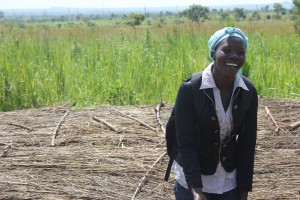 In the future, I want to farm commercially. I want to have a diversity of enterprises. Right now I have some perennials, I have some fruit trees, I have field crops, and I plan to integrate vegetables, so I want to have actually a diversity of enterprises. And soon I want to buy some animals. At the moment I am still using people’s labour in terms of hiring tractors and ox-ploughs. But already I have brought my own plough. So this December I am planning to buy the ox animals so that I do not have to continue hiring and keep more of the profits.
In the future, I want to farm commercially. I want to have a diversity of enterprises. Right now I have some perennials, I have some fruit trees, I have field crops, and I plan to integrate vegetables, so I want to have actually a diversity of enterprises. And soon I want to buy some animals. At the moment I am still using people’s labour in terms of hiring tractors and ox-ploughs. But already I have brought my own plough. So this December I am planning to buy the ox animals so that I do not have to continue hiring and keep more of the profits.
I am very much happy with the role that agriculture plays in my life. Agriculture provides a source of food for myself, my home and income generation. In Uganda, as a whole, agriculture plays a vital role and is the backbone of the country.
Posted in News | Tagged Acholi, African Revival, Gulu, School Development, School garden, Uganda | Leave a commentMeet Christopher!
November 12, 2015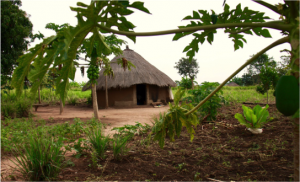 Christopher lives about 1km away from the school in the midst of the beautiful fields of Amuru District, together with his wife and his eight children. The youngest one is only 3 years old. Two of them, Grace and Mary, attend Labala Primary School – Grace is in P7 and wants to become a nurse one day; and Mary (P6) dreams of becoming a policewoman. The family is fortunate to own an extensive amount of land (50-60 ha) and as Christopher works in farming and petty-trade, agriculture skills are very important for him.
Christopher lives about 1km away from the school in the midst of the beautiful fields of Amuru District, together with his wife and his eight children. The youngest one is only 3 years old. Two of them, Grace and Mary, attend Labala Primary School – Grace is in P7 and wants to become a nurse one day; and Mary (P6) dreams of becoming a policewoman. The family is fortunate to own an extensive amount of land (50-60 ha) and as Christopher works in farming and petty-trade, agriculture skills are very important for him.
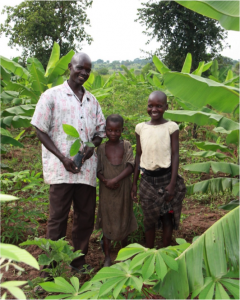 Growing up in a farming background, he is happy to see his children appreciate the value of agriculture skills for their future, despite their different aspirations:
Growing up in a farming background, he is happy to see his children appreciate the value of agriculture skills for their future, despite their different aspirations:
“The bottom line is they are all interested the same, even if they will get this profession, they still want to do farming too. They are interested, even currently, they are already taking part in the home gardens. So they are very interested to also participate in the club garden!”
Christopher’s oldest son, 21 years of age, has even decided to take up agriculture in his professional life, currently undergoing teacher training with a major in agriculture.
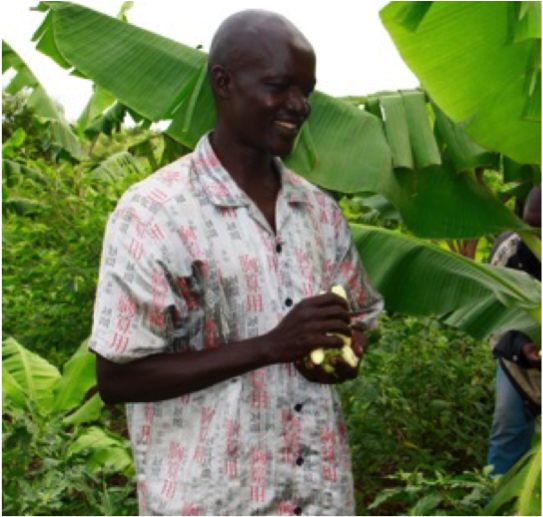 Additionally, only last year, Christopher realised the importance and value of farming, once again:
Additionally, only last year, Christopher realised the importance and value of farming, once again:
“When I was in Senior 2, I had a great passion for farming. I planted 12 Eucalyptus trees in 1992. Last year, this helped me a lot in paying school fees for my children. We cut eight stems and sold them off to pay the school fees – since then, I have seen the benefits of growing fruits and trees at home again, and I am not going to stop.”
Given this centrality of farming in his life, it is not surprising that Christopher was eager to seize the opportunity to acquire more agriculture skills. As Christopher is the PTA chairperson (Parents and Teachers Association), he was one of the first to find out about the project and was immediately motivated to mobilise parents to join:
Following the sensitisation, when they told us about the multiple benefits of this school gardens, including the benefit to the parents, to the pupils and also the benefits to the school – and based on the experience shared from other schools which had already benefited from this project, I took interests and said, I wanted to be part of this project – so that we can also divide the benefits from the project. There is especially one key thing that motivated me. It was that, after the parents have learnt the good practice from here, they will translate the knowledge and the skills home; and then they will apply it in their gardens; and then they will increase their production, and make food available for the household; and they will also be able to support the children with packed food to come to school!
Six months in, Christopher’s general impressions is very positive:
“I have seen that this programme is good, because it is linking the parents to the school. The project, it is going to empower the parents financially: it is going to create income for the parents – from the sale of the products of the garden, and also through the Village Saving and Loan Scheme, which is starting. So I am very happy, and appreciate this project so much, because the biggest challenges among the parents is the lack of money.”
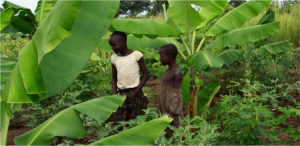 Although Christopher is regularly visiting the school due to his position as the PTA chairperson, he still appreciates how the project has triggered a greater connection to his children’s education:
Although Christopher is regularly visiting the school due to his position as the PTA chairperson, he still appreciates how the project has triggered a greater connection to his children’s education:
“The project has connected me very well, because each time the parents have they meeting, I come to school, and I am also able to follow whether they are in class, whether they have come to school and also when they go back home, I will also interact with them and say ‘today I was in your school for the parents gardens work’, so I am able to follow up with my children.”
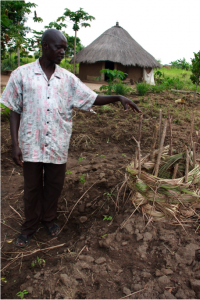 And Christopher has also benefited from the project in a very personal way:
And Christopher has also benefited from the project in a very personal way:
“Since I joined the group, I have appreciated and acquired good knowledge of planting in lines and I have also acquired the skills for making kitchen gardens, which I use to supply my home; and using a small piece of land to increase your production – which is a key knowledge I acquired and will be applying. I have also developed a passion for growing vegetables – I have planted 1/2 hectare of tomatoes! I also want to join the VSLA because it will help me manage my finances better”
Additionally, “After applying the knowledge, which I have acquired from the gardens, at home, it is also helping my family members to learn from the good practices and it is also increasing their production in the home garden.”
Today, Christopher has perfectly implemented the kitchen garden right next to his huts in order to provide his family with food, close to home. This is making a great difference for his wife, as she will now be able to make better use of their home-grown produce.
Additionally, thanks to his new skills and re-newed passion, his fields and his home garden are thriving! He was able to acquire several very favourable deals or even donations of seedlings, for mangos, bananas to eggplants, tomatoes and cacao. He is now trying to keep an eye on details and approaches his farming work with respectable planning. For example, he has brought the plantation of fruits closer to his residence, as a lot of it was stolen.
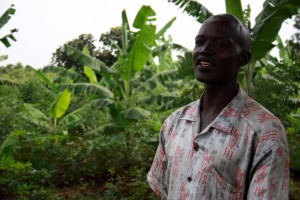 Booming with motivation and aspirations, he now has a very clear idea of how he is going to use his earnings from the SDG:
Booming with motivation and aspirations, he now has a very clear idea of how he is going to use his earnings from the SDG:
“I will prioritise on payment of school fees for the children, and then also I also want to save more money so that I can acquire a piece of land within the trading centre and built a structure, so that I can boost his business of petty-trade, of selling produce, because I am sure that in the coming year, his bananas will start producing. Plus I have other fruits too, so I want to get a place in the centre where he can sell.”
With his mind set and focused, Christopher is step by step turning his business idea into reality!
Posted in News | Leave a commentAfrican Revival’s Babra: “The SDG is a solution to the problems our rural schools face”
November 11, 2015
Babra Akello, aged 27, is African Revival’s Agricultural Project Officer. Here, Babra gives us an insight into the progress of the School Demonstration Garden project, including the benefits and challenges of the project, and some uplifting success stories that she has witnessed while working closely with the parents and students.
Looking at the situation where our beneficiaries are, I feel the SDG has come as a solution to the problems that our rural schools face. Because looking at the rural schools, parents are so far away from the school, parents are not always willing to contribute to the development of the school, so the school management and the head teachers have to pull ropes with the parents. When it reaches the time of examinations, pupils have not paid, but the school has to buy chalks, reference books etc. But the SDG brings parents closer to the school, opening their eyes to the school and contributes towards the development of the school.
And by them coming to the school, they are not just coming to work on the project, but they are coming to check on the progress and education of their children. And this follow-up for any other parents who are not involved is hard to do. And then it is benefiting them because as they come to work, they are learning different knowledge in agricultural practices, in saving the money, in actually planning for their home, and actually finding appropriate solutions to their household problems.
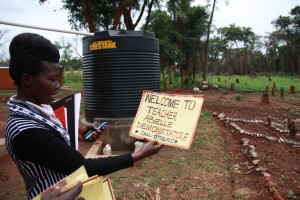 Also in a way, its even helping the communities to wipe away gender based violence. You know, most times, if all the family, the husband and wife are involved in the project, this means that they are going to listen to such messages. Because as we train them, there are crosscutting issues that I as a technical person, I do touch. On top of what the project wants from us, after training in the good agricultural practices, after doing the VSLA, there are issues of gender based violence, of HIV prevalence that we always touch upon. So in a way, the parents are all benefitting, and when they get home, they can’t now fight in their house, they can now sit together and plan for their home, plan for their education of their children.
Also in a way, its even helping the communities to wipe away gender based violence. You know, most times, if all the family, the husband and wife are involved in the project, this means that they are going to listen to such messages. Because as we train them, there are crosscutting issues that I as a technical person, I do touch. On top of what the project wants from us, after training in the good agricultural practices, after doing the VSLA, there are issues of gender based violence, of HIV prevalence that we always touch upon. So in a way, the parents are all benefitting, and when they get home, they can’t now fight in their house, they can now sit together and plan for their home, plan for their education of their children.
The agricultural practices that they learn, when they replicate at their household level, they are going to increase on their production. This means they are going to have surplus food at a household level, where they can have enough to eat, where they can have enough to keep, where they can have enough to sell and cater for other basic needs. They will be in the position to pay school fees, buy scholastic materials.
So far I would say that the project is progressing fast looking at the level we have reached. We have sensitized, we have formed the groups, we have initiated the SDGs, we have already got some harvest from the garden. And also the most interesting thing, you know the people we train, there are people who are fast learners, people who are medium, people who takes time to understand. And the most interesting part is that the fast learners have already even got to the level of replicating what they have learned form the SDG at home. So to me, that is already progress in the project.
As a good trainer, much as there are fast learners, you concentrate most on the medium and slow learners, so they can catch up with the fast learners. So like with the parents group, we cannot now say we are going to push them push them – what you do, each and every time you give assignments, today we’ve learned this, and next week people should begin replicating, and when you are looking out for who has replicated, you start out with the slow learners, asking ‘have you done this’ in a good way because you don’t have also to make them know that they are slow in learning. You just use your facilitating talents to make them also understand and slowly slowly, they will also come to understand.
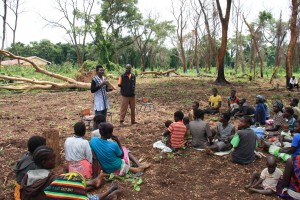 One of the challenges of the SDG is the issue of land dispute. You know, land issues in the Acholi region are not something easy, especially in Langera. During the project launch in the district, one of the committee members of the school just stood up boldly and said ‘I don’t think this project is going to work because in Langera we don’t have so much land’. And that school was already assigned to me, so I felt like ‘how am I going to overcome this?’. But something came into my mind that ‘no you go on, and do what you’re supposed to do, and maybe it can turn out to be a success story’. And when I went for the mobilisation, I found the head teacher who told me, ‘you know what, you don’t have to fear, you just come, the school is there, we are going to work together, and overcome these land issues, and what we are going to do, we are going to sit with these management committees, and make sure we apportion the SDG site to be on the other side where they are wrangling over”. So the parents came, and I used my tricks with the parents to ensure that we succeeded. And the parents were on my side, everything went well, and right now Langera stands to be a success story because there are no more land wrangles, and when the bestseller donor came, the chairperson of the SMC even highlighted that as a success – that the SDG has enabled us to solve the land issues that were in the school. So that wasn’t easy to reach the level we have now.
One of the challenges of the SDG is the issue of land dispute. You know, land issues in the Acholi region are not something easy, especially in Langera. During the project launch in the district, one of the committee members of the school just stood up boldly and said ‘I don’t think this project is going to work because in Langera we don’t have so much land’. And that school was already assigned to me, so I felt like ‘how am I going to overcome this?’. But something came into my mind that ‘no you go on, and do what you’re supposed to do, and maybe it can turn out to be a success story’. And when I went for the mobilisation, I found the head teacher who told me, ‘you know what, you don’t have to fear, you just come, the school is there, we are going to work together, and overcome these land issues, and what we are going to do, we are going to sit with these management committees, and make sure we apportion the SDG site to be on the other side where they are wrangling over”. So the parents came, and I used my tricks with the parents to ensure that we succeeded. And the parents were on my side, everything went well, and right now Langera stands to be a success story because there are no more land wrangles, and when the bestseller donor came, the chairperson of the SMC even highlighted that as a success – that the SDG has enabled us to solve the land issues that were in the school. So that wasn’t easy to reach the level we have now.
Schools are experiencing land disputes, because initially in the rural communities, somebody will just come willingly and give out land for the school. And at times they go into signing maybe an agreement that I am giving this portion of land. But eventually the person dies and either the children or the grandchildren now begin disturbing the school, and also most of the schools do not possess a land title, so such issues makes conflicts to always arise.
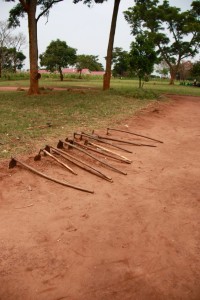 One of my favourite moments of the project was in Layima Primary School. Layima has been a school where the parents are so so much interested in the project; their numbers have been overwhelming. When you take a project in the community, the expectations are always so high, but we have a budget line that we are supposed to operate within, and it can look quite challenging. At Layima, especially the tools for the beneficiaries – at first this looked like it was a challenge because the numbers were up to 80 members, but there were only 47 hoes. My favourite moment came when we had to sit down with the parents and make them understand that this other support, the tools are just brought to ensure that work starts, but they themselves have to own the project, and if they are willing they can even contribute towards the project by coming with their hoes. And it was an amazing moment when the members agreed that ‘lets first put these hoes intact and use our own hoes’. Even up to now, we’ve not distributed the hoes, and the parents are thinking of giving them to the school, so that the entrepreneurship club can be using it. That was my favourite moment because it felt challenging but a solution was derived.
One of my favourite moments of the project was in Layima Primary School. Layima has been a school where the parents are so so much interested in the project; their numbers have been overwhelming. When you take a project in the community, the expectations are always so high, but we have a budget line that we are supposed to operate within, and it can look quite challenging. At Layima, especially the tools for the beneficiaries – at first this looked like it was a challenge because the numbers were up to 80 members, but there were only 47 hoes. My favourite moment came when we had to sit down with the parents and make them understand that this other support, the tools are just brought to ensure that work starts, but they themselves have to own the project, and if they are willing they can even contribute towards the project by coming with their hoes. And it was an amazing moment when the members agreed that ‘lets first put these hoes intact and use our own hoes’. Even up to now, we’ve not distributed the hoes, and the parents are thinking of giving them to the school, so that the entrepreneurship club can be using it. That was my favourite moment because it felt challenging but a solution was derived.
Another amazing moment was in Abera p/s. During the formation, this group had the highest expectations, more than any other group. With the trainings and mentorship, they turned out to be the best group via production and they are a group of 55 members only, but they are quite hardworking. And as I talk now, they are still leading in the production record. For the first season, they have actually got 1.7 million out of their production, and we are expecting more for the second season. So that actually amazed me, because looking at that, it makes me feel like the effort, my travel there, my trainings, has yielded fruits. So it gives me happiness.
 I hope that the project will achieve all its objectives. Looking at the objectives of bringing the parents closer, increasing the retention rates of the pupils in school, ensuring the school feeding program, increasing productivity – with the speed we are going, I hope we will achieve all the objectives.
I hope that the project will achieve all its objectives. Looking at the objectives of bringing the parents closer, increasing the retention rates of the pupils in school, ensuring the school feeding program, increasing productivity – with the speed we are going, I hope we will achieve all the objectives.
Posted in News | Tagged African Revival, Uganda | Leave a comment

